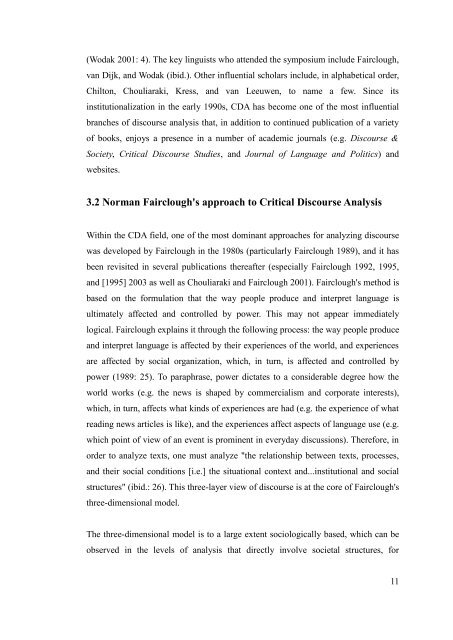Political Bias on BBC, CNN, and Fox News - Doria
Political Bias on BBC, CNN, and Fox News - Doria
Political Bias on BBC, CNN, and Fox News - Doria
Create successful ePaper yourself
Turn your PDF publications into a flip-book with our unique Google optimized e-Paper software.
(Wodak 2001: 4). The key linguists who attended the symposium include Fairclough,<br />
van Dijk, <strong>and</strong> Wodak (ibid.). Other influential scholars include, in alphabetical order,<br />
Chilt<strong>on</strong>, Chouliaraki, Kress, <strong>and</strong> van Leeuwen, to name a few. Since its<br />
instituti<strong>on</strong>alizati<strong>on</strong> in the early 1990s, CDA has become <strong>on</strong>e of the most influential<br />
branches of discourse analysis that, in additi<strong>on</strong> to c<strong>on</strong>tinued publicati<strong>on</strong> of a variety<br />
of books, enjoys a presence in a number of academic journals (e.g. Discourse &<br />
Society, Critical Discourse Studies, <strong>and</strong> Journal of Language <strong>and</strong> Politics) <strong>and</strong><br />
websites.<br />
3.2 Norman Fairclough's approach to Critical Discourse Analysis<br />
Within the CDA field, <strong>on</strong>e of the most dominant approaches for analyzing discourse<br />
was developed by Fairclough in the 1980s (particularly Fairclough 1989), <strong>and</strong> it has<br />
been revisited in several publicati<strong>on</strong>s thereafter (especially Fairclough 1992, 1995,<br />
<strong>and</strong> [1995] 2003 as well as Chouliaraki <strong>and</strong> Fairclough 2001). Fairclough's method is<br />
based <strong>on</strong> the formulati<strong>on</strong> that the way people produce <strong>and</strong> interpret language is<br />
ultimately affected <strong>and</strong> c<strong>on</strong>trolled by power. This may not appear immediately<br />
logical. Fairclough explains it through the following process: the way people produce<br />
<strong>and</strong> interpret language is affected by their experiences of the world, <strong>and</strong> experiences<br />
are affected by social organizati<strong>on</strong>, which, in turn, is affected <strong>and</strong> c<strong>on</strong>trolled by<br />
power (1989: 25). To paraphrase, power dictates to a c<strong>on</strong>siderable degree how the<br />
world works (e.g. the news is shaped by commercialism <strong>and</strong> corporate interests),<br />
which, in turn, affects what kinds of experiences are had (e.g. the experience of what<br />
reading news articles is like), <strong>and</strong> the experiences affect aspects of language use (e.g.<br />
which point of view of an event is prominent in everyday discussi<strong>on</strong>s). Therefore, in<br />
order to analyze texts, <strong>on</strong>e must analyze "the relati<strong>on</strong>ship between texts, processes,<br />
<strong>and</strong> their social c<strong>on</strong>diti<strong>on</strong>s [i.e.] the situati<strong>on</strong>al c<strong>on</strong>text <strong>and</strong>...instituti<strong>on</strong>al <strong>and</strong> social<br />
structures" (ibid.: 26). This three-layer view of discourse is at the core of Fairclough's<br />
three-dimensi<strong>on</strong>al model.<br />
The three-dimensi<strong>on</strong>al model is to a large extent sociologically based, which can be<br />
observed in the levels of analysis that directly involve societal structures, for<br />
11

















